It's Good To Be Rural King
A unique store, geographic retail patterns, and another life not so far away
Readers: This week marks the completion of the third year of The Deleted Scenes—that’s three full years, every day except Sunday, of thoughtful, illustrated, locally rooted pieces on urbanism and more. I’m offering a 20 percent discount for new subscribers, good until the end of Sunday. If you’ve been on the fence about upgrading to a paid subscription, this is a great time. Your support—whether reading, sharing, or subscribing—keeps this thing going. Thank you! To another year!
As with Pizza Hut, a lot of things used to be a Kmart.
One of them is this store in Front Royal, Virginia.
In case you’re wondering, those are the Blue Ridge Mountains in the background.
Rural King is a chain of big-box outdoor/farm equipment stores, founded in 1960—the very time when truly rural life was disappearing in much of the country. There are currently 128 of them, distributed sparsely throughout the country’s eastern half, mostly in rural-exurban areas.
Before I talk about the store itself, here are a few interesting visualizations. This is the D.C.-area distribution of Whole Foods stores:
Here’s Tractor Supply Co.:
And here, with a much more zoomed-out area, is Rural King:
You can basically map density and urban/suburban/rural patterns with certain kinds of stores. That’s really interesting.
Also interesting is that while most Rural King stores are in remote locations, relative to the largest nearby city, they’re also largely in cities—small cities, that is. To some extent they serve as lifestyle stores for recreational outdoorsy folks. But this also demonstrates that small-scale classic urbanism works with rural life and a working countryside. I’ll never get tired of pointing this out.
You can even still see this pattern in some larger cities; Lancaster, Pennsylvania, a dense old city of about 50,000 people, is surrounded by genuine countryside, with much less sprawl in between the two than you typically see. And it’s really striking to realize that this is what every city and its surroundings once looked like. We mistake a lone survivor for some kind of innovator.
But Rural King.
A large number of Rural King stores, like the one in Front Royal, were former Kmarts. In fact, of the five closest ones to me, four were Kmarts. I’ve seen this before—old-school discount department stores closing and becoming outdoor/equipment/rural-living stores, most commonly Tractor Supply Co. There are a couple of these in more rural parts of New Jersey—they began as Ames and ended up as Tractor Supply.
I find this curious, and wonder what, if anything, it tells us. Does it mean the outermost suburban areas are receding back into semi-rural places? Does it mean that those old discount stores served rural populations in a way that the larger modern ones (Target and Walmart) don’t? Which type of store was truly a better fit for those communities?
I wrote last year, touching on this question, about Roses, a regional discount store chain that retains the store sizes and location patterns of some of the older discount store chains driven out of business by Walmart and Amazon.
Rural King likewise fits in certain places and with certain lifestyles. Probably not too much of a fit for me or my lifestyle.
Just over an hour from downtown D.C. (without traffic)—in other words, not that far—is a store that serves and speaks to a completely different way of life than anything within the metro area. Now you could argue that Front Royal, along with Winchester, is the final settlement within the metro area, going west from the urban core. But I get the sense that most people living out in these two Virginia cities feel little sense of belonging to Washington, and that likewise most folks in the metro area view them as distant places.
I remember, from my days of working in the D.C. office of a conservative magazine, running into guys who obviously loved living in or near the city, and availing themselves of all its amenities and cosmopolitan interest. Yet they also loved to pretend they hated it. They pretended there was something “soft” or elitist or effete or, worst of all, liberal about the urban lifestyle.
I think I absorbed some of this attitude, just being around it. I remember one afternoon in 2020, sitting outside a Starbucks on a busy street in Arlington, with my wife and her friend—both foreign-born—casually playing Pokémon GO, sipping a Starbucks pink drink, and watching the fit, well-dressed mostly 20-somethings walk by with their dogs (some had kids and friends too). And I remember thinking, you know what, there’s absolutely nothing wrong with this.
There’s so much absolute garbage on the internet: “Don’t trust men who don’t lift,” “Men shouldn’t have female friends other than their wives,” “We should all work on farms and grow our own food,” all the scammy, scummy tech-bro “grindset” stuff, on and on and on. And none of it’s real.
Part of the animating spirit of this newsletter has always been my sense of belonging to and having pride in Northern Virginia and the D.C. area, especially its diverse, culturally interesting suburbs. I’ve felt pretty much since I moved down here that this supposedly soulless landscape is very much a “real place.”
But I also think about the possibility that I might live in a bubble. I wonder how long it would take me to realize anything had happened, if the world beyond the 20-mile radius around my home disappeared?
I wrote a couple of weeks ago:
It’s one thing to get on Twitter and say “Small towns are tiny cities defined by their land use,” or “Real working people don’t like stupid oversized pickup trucks.” It’s another thing to communicate these ideas directly to, say, the folks in Rural King. I don’t know if they would agree!
The fact that visiting an outdoor store in a town an hour away makes me feel like I’m going on some exotic tour gives me pause. And I guess the idea of being literally grounded by a day of physical work almost strikes me as some kind of corrective to this class/lifestyle/whatever blindness. And if I, a right-leaning guy from the suburbs, feel a little out of place an hour from the city, I can only imagine how much perspective a lot of young big-city urbanists are missing.
There’s a big country out there, and a lot of it is basically foreign to me. But unlike the internet, it’s real. And as an urbanist, with allegedly universal ideas about how to make our places better, that gives me pause. That’s part of what brought me to this farm store in Front Royal.
You may be wondering, then, what this store actually looks like. You’re in luck! (The outside of the store is interesting too, but first the interior.)
Start by grabbing some free coffee and popcorn! It probably costs them peanuts, so to speak, but it makes such a difference in the customer experience to get a little “extra,” to feel like you’re being invited to browse and linger and enjoy your visit.
As a former Kmart, the store is larger than you’d expect—at least, I’m always surprised how big old Kmarts were. There are so many different things for sale, many of which I can’t identify. But here’s one I can: the Lodge cast iron department, with a wider selection than I’ve ever seen in a store, including cute little dishes for roasting corn on the cob!
The pan on the left is huge—about double the typical large cast iron skillet. As you can see at the right, they also have tiny skillets, almost too small for an egg. Though if (unlike me) you can figure out how to truly season them to a non-stick finish, you can probably make a McDonald’s style egg in one of them.
There’s a whole shoe department in a little alcove with a lower drop ceiling. I wonder what Kmart department it was? There’s a pretty good selection of clothing too, leaning towards durable/outdoor/work clothing.
How many stores sell chicks and guns?
In addition to chicks, they even sell rabbits at certain times, which is somewhat controversial, because they’re so often neglected by impulse buyers—not these bunnies, though! Local Rural King stores even buy rabbits from local breeders. It’s interesting that a big-box chain store would have anything to do with individual people as suppliers. In a sense, this store retains some of the spirit of an old farm community.
Those pictures above are a fraction of the selection. This store has everything: veterinary medicines, power tools, yard tools, pipes and hoses, archery equipment, bullets, beef jerky and sausage-making equipment, grills and smokers, trail cameras, giant toolboxes, air compressors, propane and electric heaters, fans (including heavy-duty models you won’t find in a regular store), bolts, pumps, spray and regular paint specifically formulated for tractors, lawnmower and tractor belts in all sizes, duck and goose drinking stations, airsoft rifles, canning and jarring equipment, herbs and spices, inexpensive basic small appliances, t-shirts and water bottles with farm/Christian/Americana slogans (weird to me, but I’m a Northeastern Catholic).
For the right audience, it’s heaven. And I can imagine buying a few of these things, too.
And then there are the tractors.
Unlike Tractor Supply, Rural King actually sells tractors. It’s a funny bit of trivia. (Tractor Supply’s own website states, “What can you buy at Tractor Supply Company? Everything except tractors.”)
And Rural King doesn’t just sell tractors; it sells Rural King tractors, branded “RK” and made by a South Korean OEM. They’re quite a bit cheaper than the two big names, John Deere and Kubota, and are considered to be pretty solid hardware. The issue is the parts and service.
I did a little reading on this when my dad was looking at tractors (smaller ones) for my parents’ property, a large lot outside town, so I knew a little bit about the RK tractors. I found it much more interesting than I expected to.
Several Rural Kings in old Kmarts with an auto garage department (Kmart had that too) have converted the auto shops into tractor repair facilities, with tractor repairs generally done at local stores rather than a network of service centers or dealers, which don’t exist for the RK product line.
The parking areas on the sides of the stores are also typically used as de facto tractor showrooms, with the tractors and their larger attachments displayed outdoors. It’s curious to see parking spaces used for commerce like that. It makes me wonder what sort of zoning or permitting issues this might have raised.
Here’s a comment from a Reddit thread I found interesting:
Rural King just purchased the old KMart location here in Chambersburg, PA. They have started fixing the property with fresh paint, and new roof. They also have it on the Internet as a future Rural King site. They are also leasing or selling the out parcels.
The tractor supply in Chambersburg has ditched almost all of its farm related outside gear like fence, gates, 3pt implements, etc. they have put in a new large garden center like at Lowes.
Now the Lowes 3 blocks away is taking part of their Garden Center area and putting in watering troughs, gates, hog panels, and deer stands, etc.It is fun to watch the evolution of retail.
“Perhaps they shouldn’t call themselves ‘Tractor Supply’ anymore then,” wrote someone on another tractor forum thread. “They might call it ‘Suburban Botanical’ supply or something like that.” Again, Rural King is not a “lifestyle” store. It’s the real deal.
Here’s a long, fascinating comment on both the tractors and the overall store:
Your comments mirror my thoughts when I see the RK tractors offered at the retail store. There are a number of strategic differences in the approaches, but the RK machine is an example of what can be offered at a price point that still allows Rural King to make money selling them. Sure, the profits on an RK machine are surely a fraction of the profits on a Deere machine and the other main difference is in how they are marketed by the selling organization.
When you purchase a John Deere, you are purchasing a well known, highly regarded product supported by a vast dealer network which has excellent market presence in all parts of the U.S. The company is financially very sound and quite diverse. The tractor is the core of John Deere’s global business and they have built a group of companies which cover the agricultural industry as well as forestry, heavy equipment, road, highway and bridge construction and all of the necessary technology to support those vast industries.
When you purchase a Rural King tractor, you are purchasing a TYM tractor which is built and privately labeled for Rural King. After looking at the RK product as well as the TYM offerings, it's clear that RK is having TYM build their machines to specific target markets and cleverly offering many of the beneficial options as standard equipment which help the machine owners expand the use of their machines. However, RK is a farm and rural lifestyle retailer, which distributes the products made by other organizations. They are cleverly expanding precisely as Meager Hair pointed out, by buying up former retail locations and “remodeling them” to meet their needs.
Rural King is privately owned and was founded in 1960. They are very prudently acquiring their store locations for a fraction of the cost of what other competing retailers spend to build cookie cutter buildings. You see the difference inside of many of the Rural King stores and I have been in 4 and all were prior K-Mart stores. All of the stores show their age when compared to their competitors, but I will also say they are always busier than their local competition of TSC.
Clearly, Rural King is committed to their tractor sales business as they continue to expand it. There are a number of things which they could do to improve their tractor sales, starting with having dedicated sales staff which is trained to sell the product. Right now, they often take a department manager and assign them the task of selling the tractors, but my experience is the managers lack the training to help the customers get what they desire and are seeking. Hopefully, they will work on this aspect of their business, plus working out many of the kinks in their financing offer, etc.
Retailers have customarily made products available and waited for the consumer to purchase them. Dealers have dedicated and trained sales and service staff, to support their customers and help them acquire what they need. There is a huge difference between offering a commodity and selling a premium product. Competing on price is what gives some an incentive to consider their products, but it takes a sales professional to help the customer make the transition from being a prospective buyer of the product to being an owner of the item. And as we know, these tractors offer a myriad of sales opportunities for implements, accessories, etc. which is where the sales professional comes into play.
As I see it now, they attract two prospective types of customers. Those who are driven by price and who really don’t have tractor ownership experience and the very experienced tractor owner, who really doesn’t rely on their dealer other than to be a reliable parts source and to purchase the equipment they need to complete their tasks and projects.
It’s an interesting product line and marketing method to watch, as someone who has spent his life in sales and building successful companies. With the right people in charge of the tractor sales business, they could dramatically increase their sales of the machines. But that’s for another thread, or at least another post.
In the meantime, its interesting to watch their business and how they are approaching the sales of this machinery.
Such an interesting story of business models, the built environment, and a different life a stone’s throw from my own place.
Find all of my Rural King photos here!
Related Reading:
Thank you for reading! Please consider upgrading to a paid subscription to help support this newsletter, discounted just this week! You’ll get a weekly subscribers-only piece, plus full access to the archive: over 900 pieces and growing. And you’ll help ensure more like this!




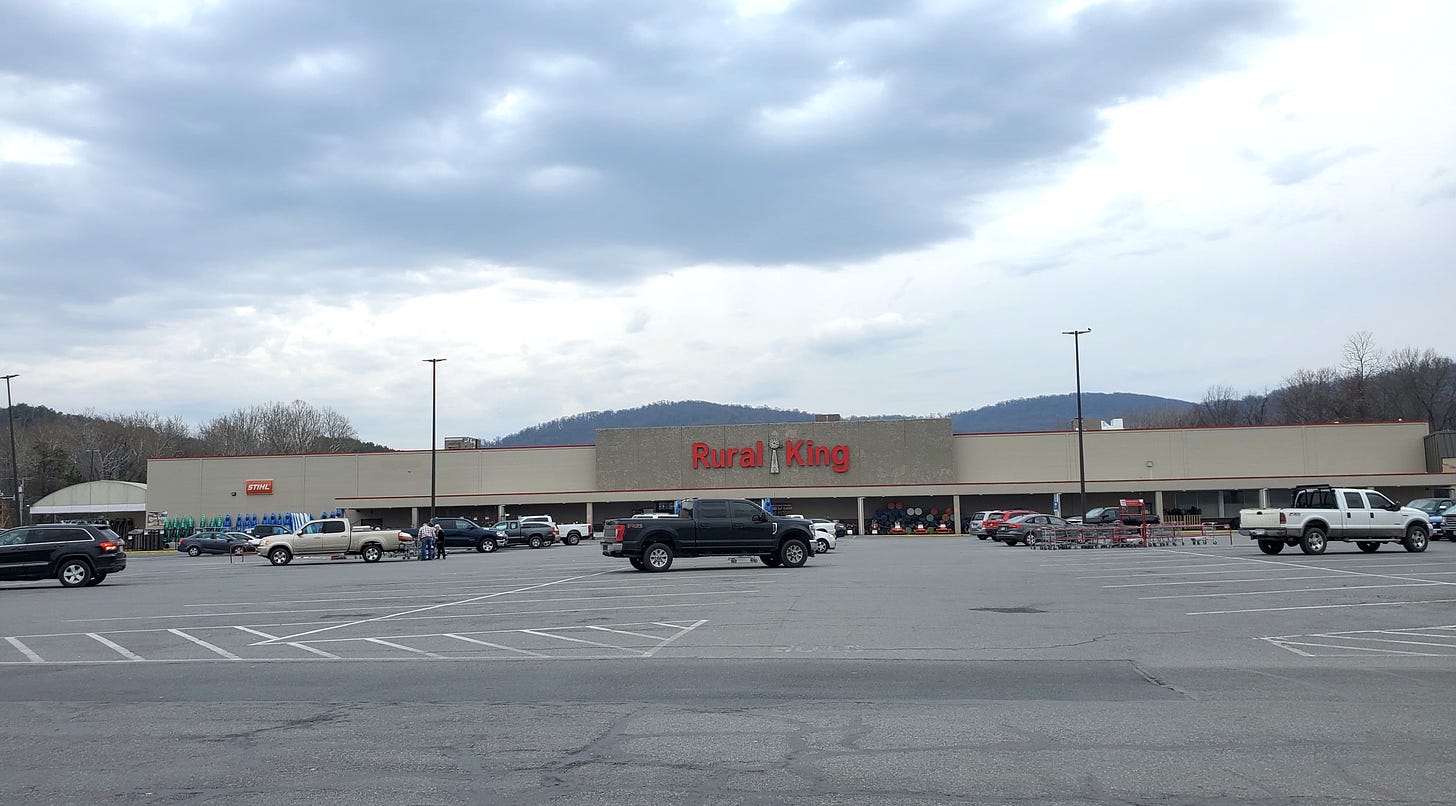
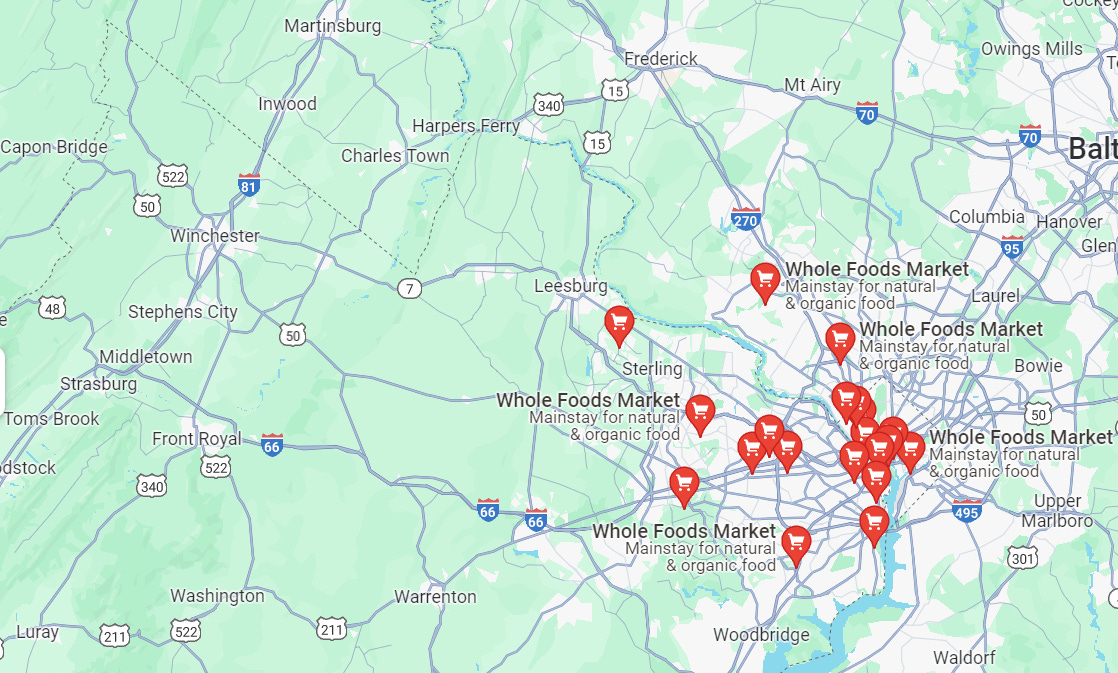
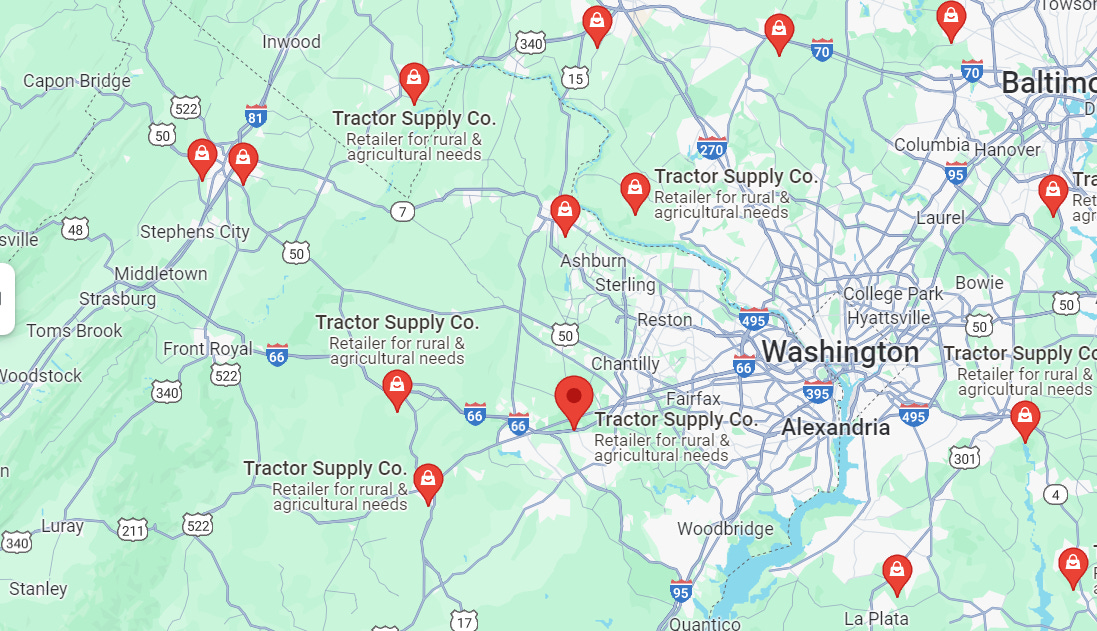
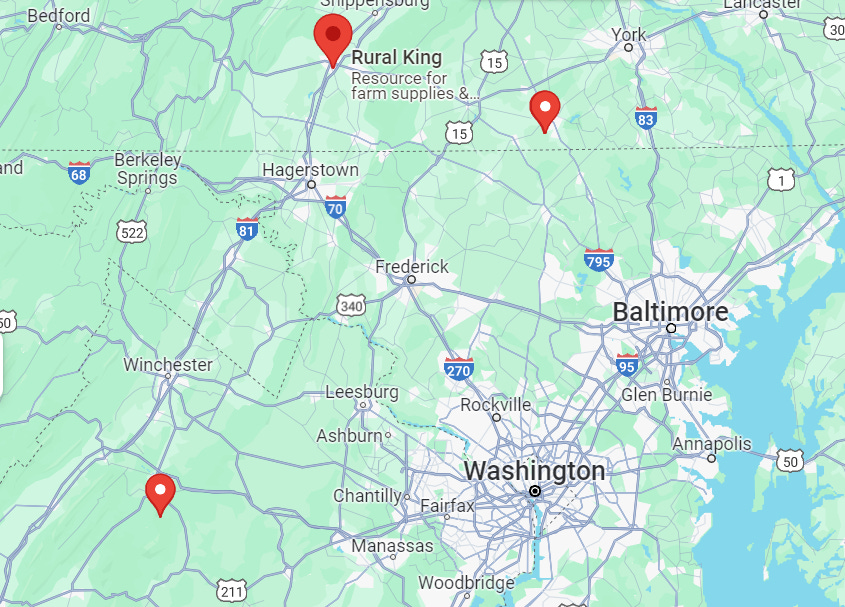
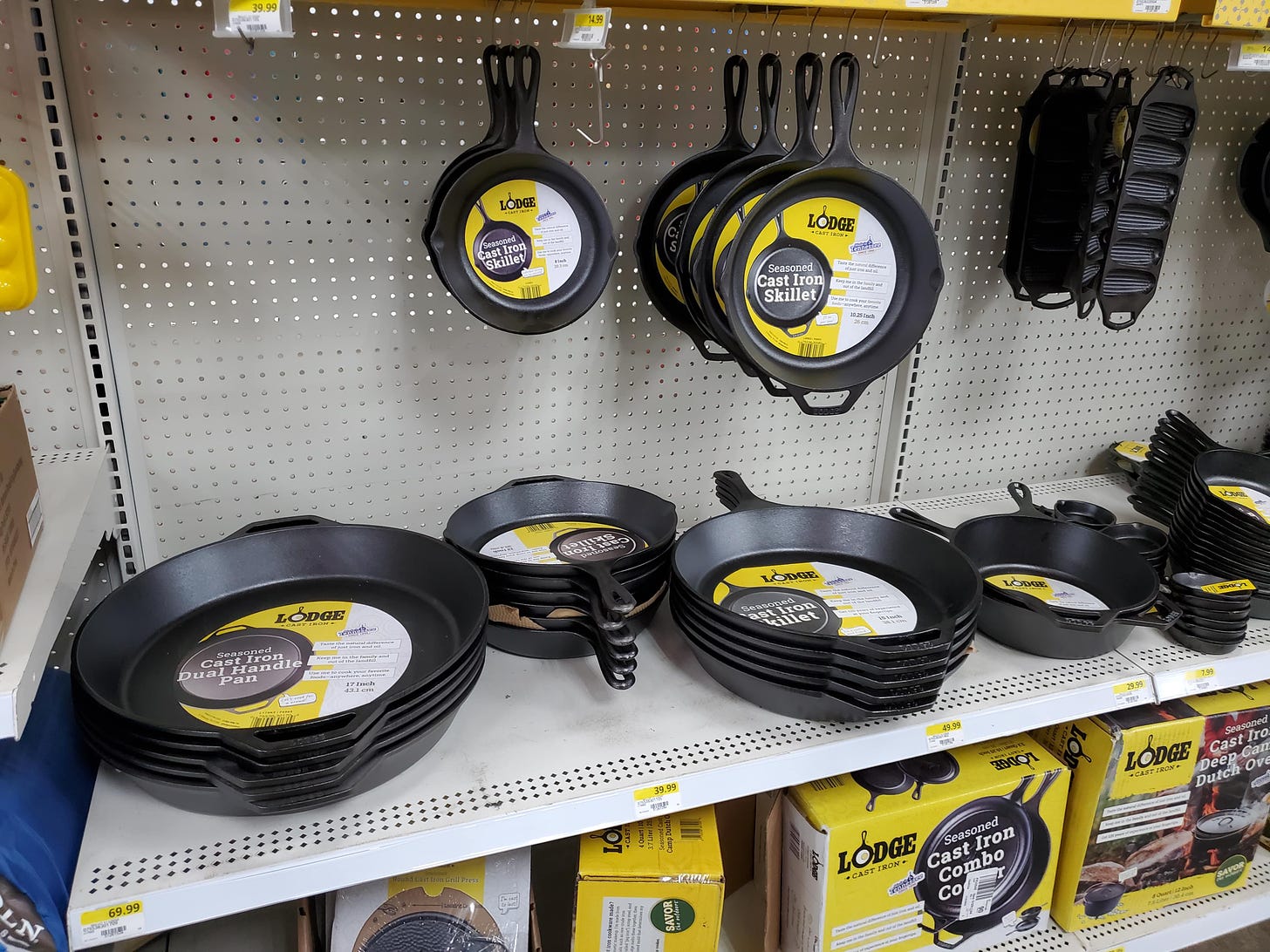
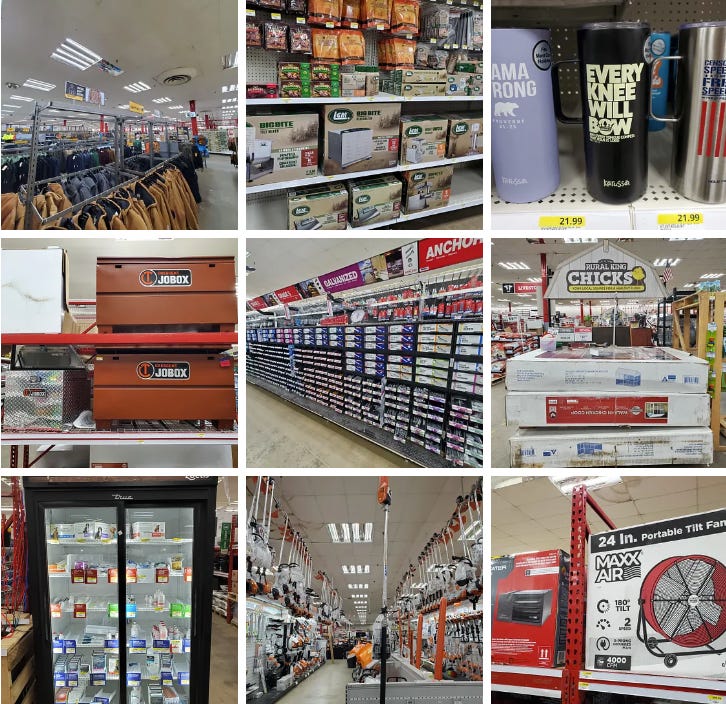
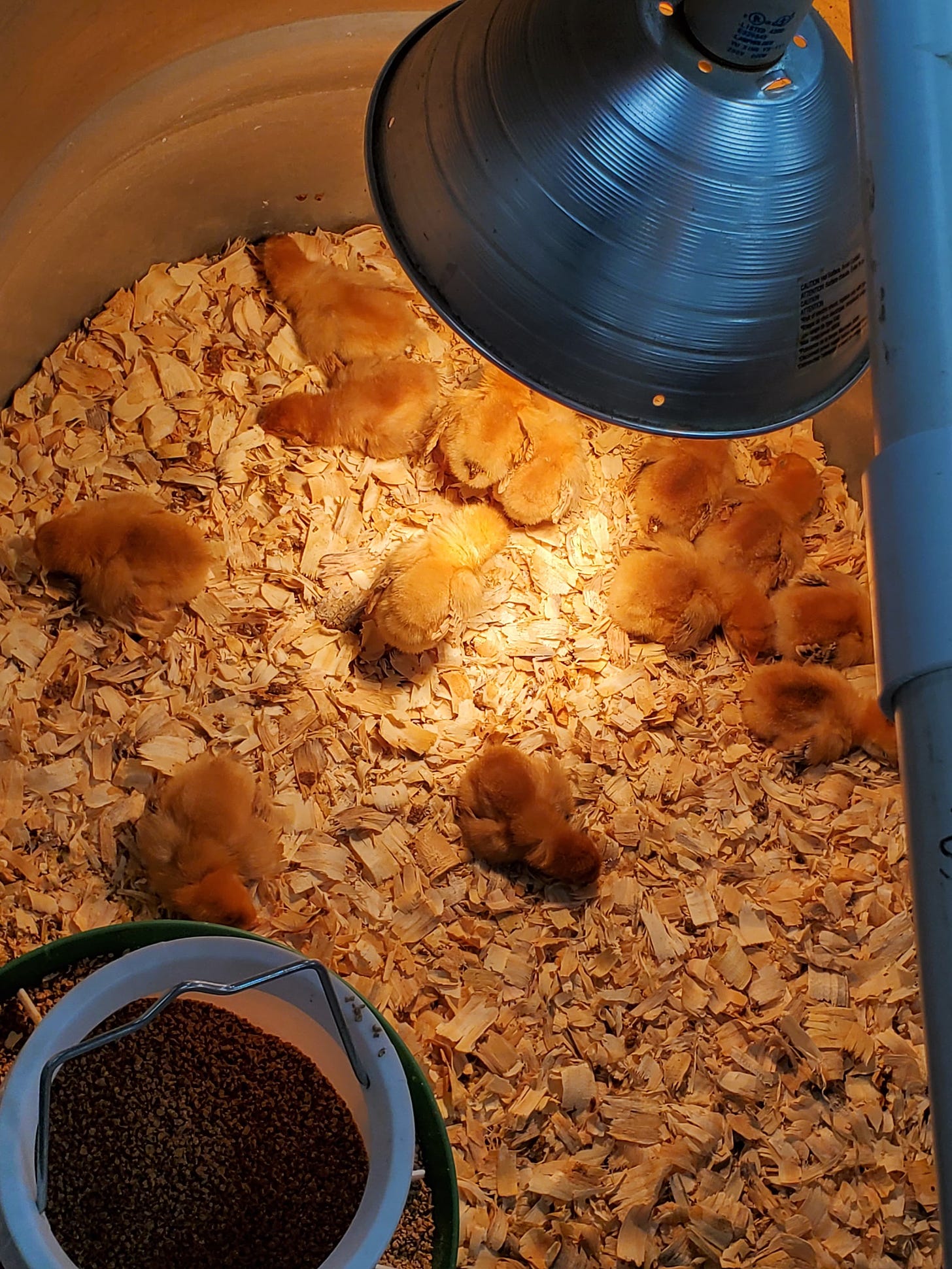
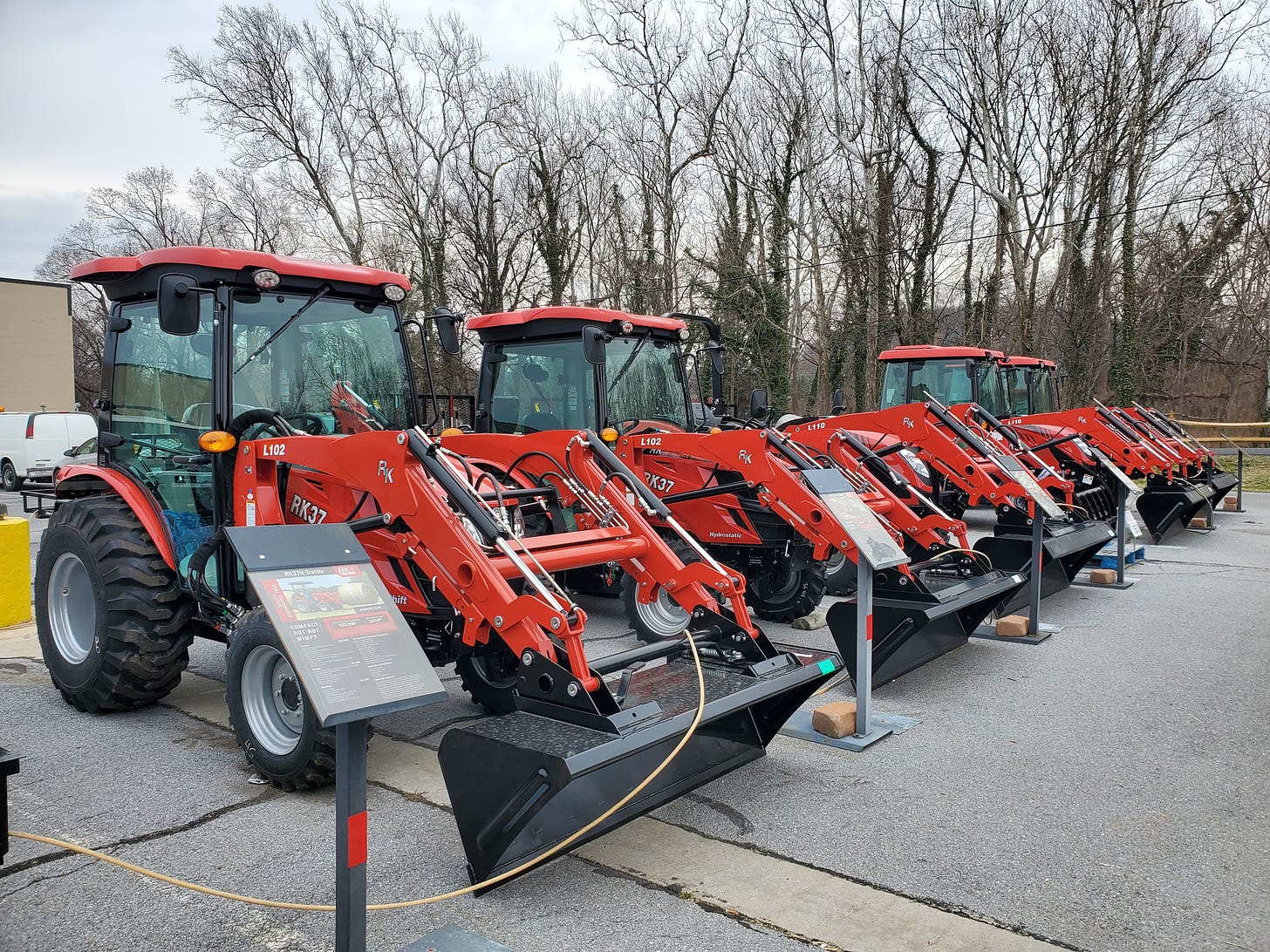
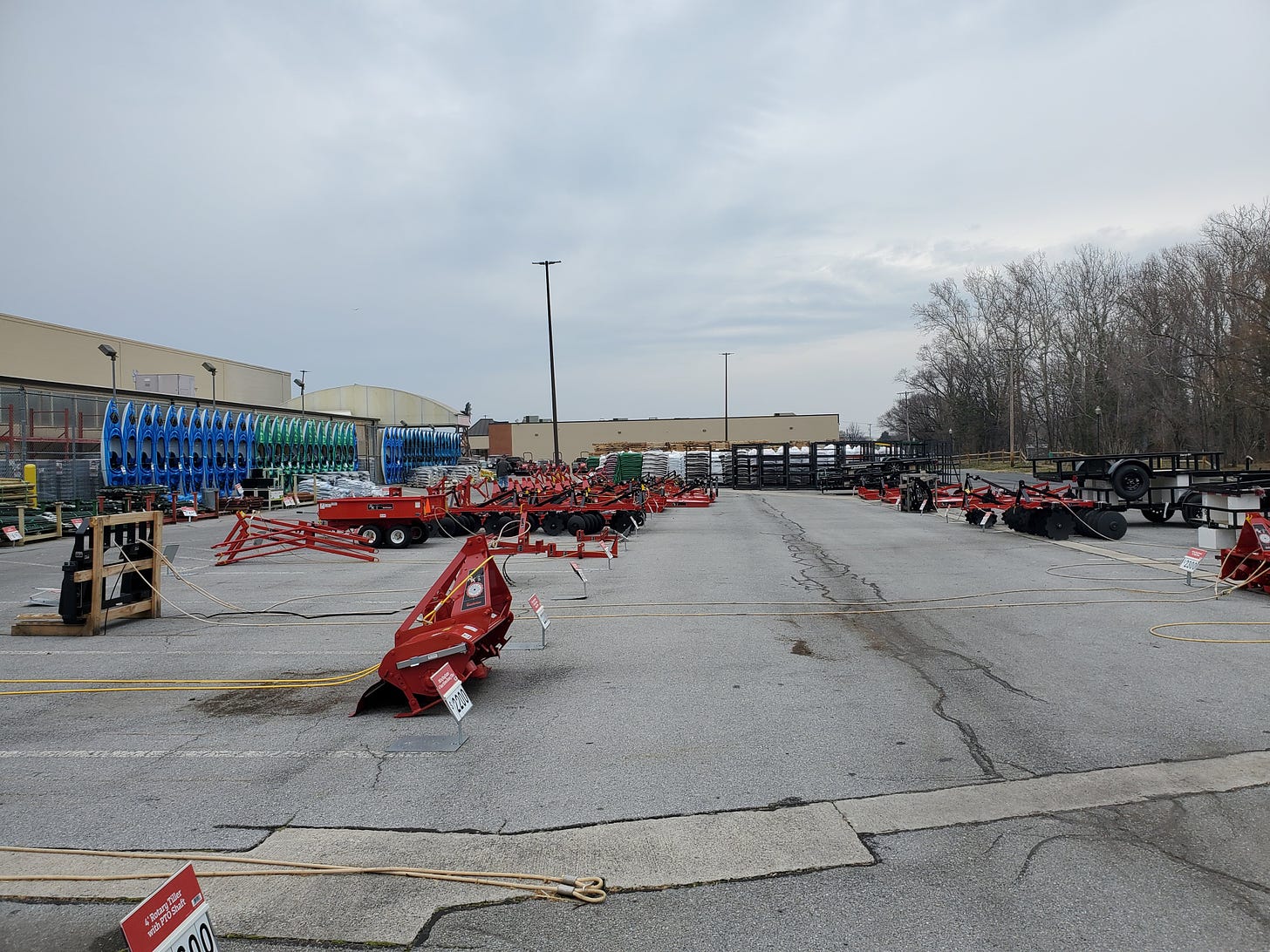
* The cast-iron pan on the right in the photo is actually for making cornbread, not roasting corn. The little loaves come out of the oven imprinted with the pattern of miniature ears of corn! Cute, huh?
Vaguely related, we do (or did) business with a farm supply store in Bogota for a farm about an hour from Bogota. Over time it has morphed into a pet supply store for city people and their pets. :) And the farm supply stores in the little town close to the farm have gotten better as the farms around have gotten more commercial and product specialized. Ours is not specialized, but around us are mushroom cultivation, floral shop greenery cultivation, a largish hog farm, and several small timber lots.
Interesting to see economic development happening up close.